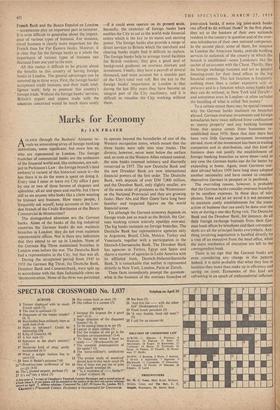Marks for Economy
By IAN FRASER
A GLANCE. through the Bankers' Almanac re-
veals an astonishing array of foreign banking institutions, some significant, but more less so, who are represented in London. The foreign branches of commercial banks are the embassies of the financial world and, like embassies, are sub- ject to Parkinson's Law : the foreign branch's (and embassy's) variant of this historical canon is—the less there is to do the more. is spent on doing it. Every time I enter or leave my City office I pass by one or two of these havens of elegance and splendour, all air and space and marble, but I have still to see anyone who looks like a client wanting 'to transact any business. How many people, I frequently ask myself, keep accounts at the Lon- don branch of the Credit Ruritanien or the Banco Commercial de Montecristo?
The distinguished absentees are the German banks. Alone of the banks of the big industrial countries. the German banks do not maintain branches in London; they do not even maintain representative offices. Nor is there any indication that they intend to set up in London. None of the German Big Three maintained branches in London even before the war. The Deutsche Bank had a representative in the City, but that was all.
During the occupation period from J945 to 1953 the German Big Three, the Deutsche Bank, Dresdner Bank and Commerzbank, were split up in accordance with the then fashionable views on `deconcentration.' None of the three was permitted to operate beyond the boundaries of one of the Western occupation zones, which meant that the three banks were split into nine banks. The divorce, however, never went below the surface and, as soon as the Western Allies relaxed control, the nine banks resumed intimacy and discreetly remarried in 1957. The new Deutsche Bank and the new Dresdner Bank are now international financial powers of the first order. The Deutsche Bank, with deposits of over DM 7,000 million, and the Dresdner Bank, only slightly smaller, are of the same order of greatness as the Westminster or the National Provincial and they are growing faster. Herr Abs and Herr Goetz have long been familiar and respected figures on the world financial scene.
Yet although the German economy depends on foreign trade just as much as the British, the Ger- man banking system scarcely operates overseas. The big banks maintain no foreign branches. The Deutsche Bank has representative agencies only in Argentina, Brazil, Chile, Mexico, Turkey and Venezuela, together with a participation in the Deutsch-Uberseeische Bank. The Dresdner Bank has agencies in Turkey, Egypt and Spain and shares a number of agencies in Latin America with its affiliated bank, Deutsch-Stidamerikanische Bank. It is remarkable that neither is represented directly in New York, London, Paris or Ztlrich.
These facts immediately prompt the question : what is the business of the overseas branches of
joint-stock banks, if some big joint-stock banks can afford to do without them? In the first place, they act as the bankers of their own nationals resident in the country in question and of the over- seas subsidiaries of their own national companies. In the second place, some of them, for instance in London the American banks, provide banking services to nationals of the country in which the branch is established—some Londoners like the cachet of an account with the Chase. Thirdly, they do foreign 'exchange business and 'act as general listening-posts for their head offices in the big financial centres. This last function is frequently nothing, more than a rather expensive acte tie presence and is a function which some banks feel they can do without; in New York and Zurich— and sometimes even in London—it often includes the handling of what is called 'hot money.'
To a certain extent there may be special reasons why the German banks maintain no branches abroad. German overseas investments and foreign subsidiaries have twice suffered from confiscation as 'enemy property' and any banking business from that source comes from businesses re- established since 1950. Since that date there has been very little German permanent investment abroad; most of the investment has been in trading companies and in distribution, and this kind of business does not justify the establishment of foreign banking branches to serve them—and in any case the German banks can do far better by expanding at home. Again, most Germans resi- dent abroad before 1939 have long since adopted another nationality and have ceased to consider themselves German in passport or in passbook.
The overriding reason, however, is probably that the German banks consider overseas branches to be needless expenses. In these days of tele- phones, Telex and jet air travel it is not necessary to maintain costly establishments for the trans- action of business that can easily be done over the wire or during a one-day flying visit. The Deutsche Bank and the Dresdner Bank, for instance, do all their foreign exchange business from their Ger- man head offices by telephone and their correspon- dents are all the principal banks everywhere. Any- thing involving negotiation is handled directly by a visit of an executive from the head office, while the mere mechanics of execution are left to the correspondent bank.
There is no sign that the German banks are even considering any change in this pattern. Indeed, it is quite probable that what they lose in business they more than make up in efficiency and saving on costs. Economies of this kind arc refreshing in an epoch of ambassadorial inflation.






































 Previous page
Previous page